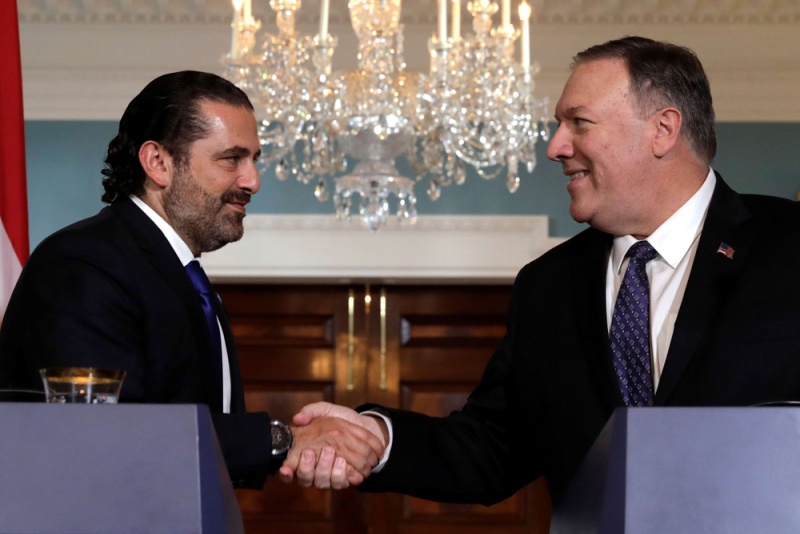Hariri’s Departure Exposes Contradictions of U.S. Policy Toward Lebanon
Tony Badran/FDD-Policy Brief/July 22/2021
طوني بدران/مؤسسة الدفاع عن الديموقراطيات: فشل الحريري واعتذاره يكشفان سياسة التناقضات الأميركية الخاصة بلبنان
After nine months of negotiations against the backdrop of a financial meltdown, Saad Hariri has failed to form a new government in Lebanon and has stepped down as prime minister-designate. Hariri’s exit underscores a contradiction in U.S. Lebanon policy, which professes the need for structural change while continually investing in the Hezbollah-dominated political order and its pillars.
On the same day Hariri announced his resignation, Secretary of State Antony Blinken put this contradiction on display. In a statement, Blinken described the failure to form a government as a “disappointing development for the Lebanese people.” The reason for the disappointment, the statement went on to explain, is that it is “critical that a government committed and able to implement priority reforms be formed now.” In other words, the Biden administration harbors the belief that the same corrupt politicians, led by Hezbollah, who drove Lebanon’s economy into the ground will now reform the sclerotic sectarian system from which they draw their communal stature.
Blinken’s statement omitted any reference to Hezbollah, by far the dominant actor in Lebanon’s politics. At a time when the prevailing chatter in Beirut and Washington was about the need for a “technocratic” government, Hariri, upon his nomination as premier-designate, quickly offered Hezbollah and its Shiite partner Amal their share of ministerial portfolios up front, most importantly the Finance Ministry. For their part, the French, with whom the Biden administration is coordinating policy, have been talking to Hezbollah as a primary interlocutor.
By lamenting Hariri’s failure to form a government — and leaving aside the pretense it would have pursued meaningful reform — Blinken’s statement implies the Biden administration would acquiesce to continued Hezbollah predominance, provided that a multi-party coalition served as the necessary fig leaf. Blinken’s statement also hints at another concession: By adding the qualifier “priority” to the reforms the United States says it is calling for, the statement suggests a lowering of the threshold for what is expected of the Lebanese in order to receive additional foreign funding.
Ahead of Hariri’s stepping down, the United States and France made a push to involve Saudi Arabia in the Lebanese theater, given Riyadh’s prior patronage of Hariri and its long-suspended largesse toward the political order in Beirut. Perhaps Washington and Paris were making a last-ditch effort to get the Saudis to back Hariri or, if not, to support an alternative choice for prime minister. More likely, the administration wants the Saudis to invest both in the Lebanese Armed Forces (LAF) and in the next act in Beirut: the parliamentary elections scheduled for next spring.
Blinken’s statement references “the 2022 parliamentary elections, which should be held on-time and conducted in a free and fair manner.” This emphasis on the elections signals the United States is responding to the dysfunctional rhythms of Lebanese politics and internalizing Lebanese parochial considerations. The administration appears to believe that these elections present an opportunity to break the grip of the sectarian barons and to introduce the representatives of “civil society” into parliament. But the notion that these elections, even if they take place on time, will usher in a change in the real balance of power or in the structure of the system is fanciful.
Along with this misconception about Lebanese elections, to say nothing of these “civil society” groups, administrations of both parties have advocated investment in the LAF as an instrument to change the status quo. The Biden administration, like its predecessors, has doubled down on this policy, ignoring Lebanon’s reality, and is continuing to waste U.S. taxpayer dollars on a chimera.
*Tony Badran is a research fellow at the Foundation for Defense of Democracies (FDD), where he also contributes to FDD’s Center on Military and Political Power (CMPP). For more analysis from Tony and CMPP, please subscribe HERE. Follow Tony on Twitter @AcrossTheBay. Follow FDD on Twitter @FDD and @FDD_CMPP. FDD is a Washington, DC-based, nonpartisan research institute focusing on national security and foreign policy.























